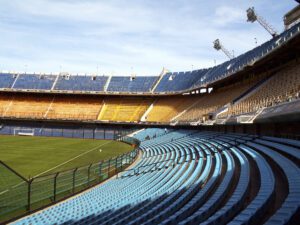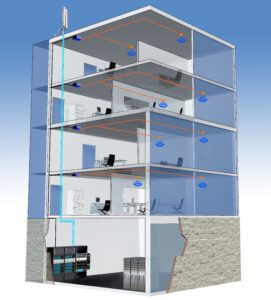 Proterial Cable America (PCA) strives to help connect people through our high-performance fiber optic and copper cables. But we’re also leaders in wireless cable manufacturing and provide solutions for the increasing need for consistent and reliable coverage, especially where cell towers struggle. Our high-quality Distributed Antenna System (DAS) cables help meet the ever-growing demands of modern communication.
Proterial Cable America (PCA) strives to help connect people through our high-performance fiber optic and copper cables. But we’re also leaders in wireless cable manufacturing and provide solutions for the increasing need for consistent and reliable coverage, especially where cell towers struggle. Our high-quality Distributed Antenna System (DAS) cables help meet the ever-growing demands of modern communication.
A DAS is a network of small antennas that are applied to an area to improve wireless service, mainly used in areas where cell towers don’t reach like stadiums or other large buildings.
A DAS works by setting small access points throughout the area needing coverage so that instead of relying on the one tower’s range for service, the many access points work together to make a patchwork of coverage.
4G LTE and 5G Connectivity is enhanced through the use of the system.
 There are two types of DAS—the Passive DAS, usually used in small to medium buildings like a school or small office building; and an Active or Digital DAS, which is typically used in large buildings like stadiums or skyscrapers.
There are two types of DAS—the Passive DAS, usually used in small to medium buildings like a school or small office building; and an Active or Digital DAS, which is typically used in large buildings like stadiums or skyscrapers.
Using repeaters, which are devices that amplify a weaker signal, a Passive DAS takes a signal from an outside antenna and extends it by sending the signal through cables to nodes around the building. The Passive DAS can only be used over shorter ranges and have a tendency to make a lot of noise.
An Active or Digital DAS uses fiber optic cables to send a signal throughout a building. The system connects to the main cell network and then distributes digital data. This type of DAS has higher quality and covers a larger area while supporting more users.
Over the last several years, wireless traffic has increased exponentially. AT&T reported an 80,000% increase in cellular data from 2007-2017 and more than 70% of cellular connections begin inside buildings.
With all of that traffic typically using building connections instead of cell towers, signal strength can be a problem when it can’t penetrate walls or windows in large buildings. DAS provides low-power antennas inside the building to keep the reliability people expect from their service.
There are multiple scenarios where DAS is needed in order to keep up with the use of wireless customers. Sports stadiums and arenas, convention centers, hotels, office buildings, universities and other schools are just some places where a DAS is necessary, but also there are scenarios when safety demands signal strength.
Local laws sometimes specify the ability for every building requiring indoor antenna coverage to carry the public safety radio signal for local police, fire and emergency services. Another primary use case is inside mass transit tunnels.
Using a DAS can bring several advantages to your wireless network. It can mean a better more reliable and consistent communication chain amongst employees and potentially increased productivity. While this is more of a theoretical advantage, there are multiple demonstratable benefits the technology offers.
Speak with an Expert
To Discuss Your Application Needs
 PCA offers our portfolio of Power+ solutions for DAS applications. Our UL Approval permits up to six fiber in both single-mode & multi-mode, combined with power wires. Select from a minimum of two to a maximum of six, 300V rated DC conductors. Both 250 and 900um tight-buffer configurations are available and if armor is needed, we can offer aluminum interlock as well.
PCA offers our portfolio of Power+ solutions for DAS applications. Our UL Approval permits up to six fiber in both single-mode & multi-mode, combined with power wires. Select from a minimum of two to a maximum of six, 300V rated DC conductors. Both 250 and 900um tight-buffer configurations are available and if armor is needed, we can offer aluminum interlock as well.
PCA’s Power+ hybrid solutions are available with a plenum rating, CMP-OF, CL3P-OF and CL2P-OF. These Indoor/Outdoor configurations are fully compliant to ICEA S-120-742, Hybrid Optical Fiber and Power Cable for use in Limited Power Circuits.
Our Power+ hybrid cables provide an ideal connection when you need to route both data & limited power across longer distances.
Our Wireless products support Macro & Micro Cells, Building Infrastructure, Distributed Antenna Systems & Smart Building needs. We can ensure top-quality performance for increased bandwidth with lower latency, leading to improved streaming & faster downloads.
Distributed Antenna System cables made by PCA are perfect for anyone looking to improve their wireless capabilities. PCA cables meet the challenges of modern networks and our experts are ready to answer any questions you might have.
Contact us today to get started!